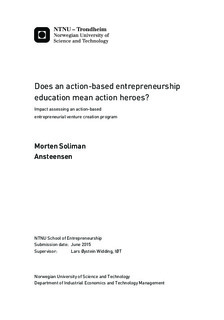Does an action-based entrepreneurship education mean action heroes? - Impact assessing an action-based entrepreneurial venture creation program
Master thesis
Permanent lenke
http://hdl.handle.net/11250/2352827Utgivelsesdato
2015Metadata
Vis full innførselSamlinger
Sammendrag
Entrepreneurial venture creation programs (VCP) stand out from traditional entrepreneurial education programs with its high focus on action-based activity and learning through venture creation. The high demand for resources needed to operate VCPs is forcing program directors to frequently have to prove program relevance and impact to stakeholders. While researchers have done well on unveiling program obstacles and design, little research has been done on how students and graduates are affected by a VCP. Through establishing an impact assessment scale, measuring entrepreneurial self-efficacy (ESE), entrepreneurial intentions and entrepreneurial impact, then testing it on students and graduates from a VCP, this study takes an important step towards enhancing our understanding of a VCP s impact. In particular, the findings in this thesis have implications for the VCP program directors and policy makers as the results show specific areas of improvement and theoretically grounded effects of the programs. In addition, future program evaluations are suggested to perceive VCPs as an arena for testing the robustness of entrepreneurial intentions, rather than a mechanism for increasing intentions.
